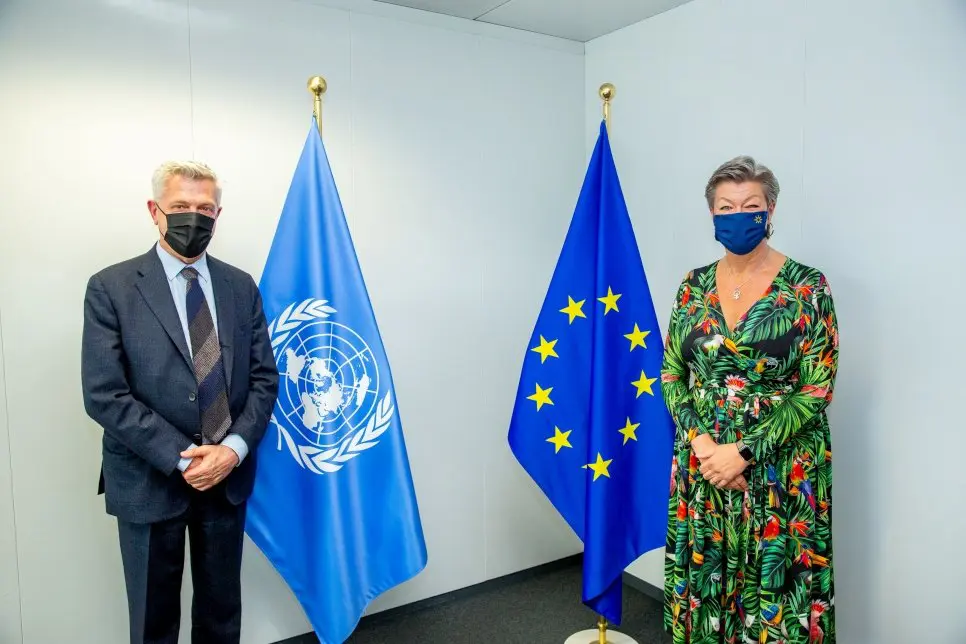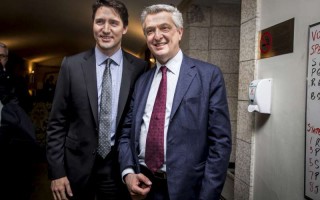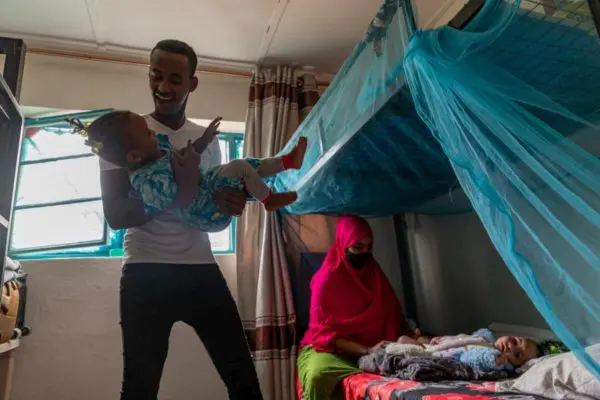
UN High Commissioner for Refugees Filippo Grandi at joint press event with European Commissioner for Home Affairs, Ylva Johansson. © European Union, 2021
Thank you very much, thank you Ylva. I just want to echo what Commissioner [for Home Affairs] Johansson just said. I’m here for two-three days in Brussels for a number of meetings. The fact that over this weekend, we have witnessed again arrivals through the Central Mediterranean is further proof that we do need the [European] Pact [on Migration and Asylum].
Europe needs a predictable mechanism to deal with these matters. Yes, there were several boats coming, but we’re talking about manageable numbers.
Through a rational and agreed mechanism, this would be very manageable, in our opinion.
Even if, as always in the beginning of the summer, there are more arrivals – what we need is a more and more predictable, more efficient State-led mechanism to rescue people at sea, because we’ve also seen in the last few weeks a lot of loss of life.
We need, of course, a predictable mechanism for disembarkation and relocation.
We need to stop the pushbacks that are happening all along the external border of the European Union. And we need a mechanism to investigate those pushbacks when they happen.
And I fully agree with the Commissioner – we need a mechanism that balances proper arrival arrangements with solidarity through relocation.
I personally think that this is the least that Europe could put in place.
Let’s not forget that when we talk about sharing the responsibility for refugees, asylum seekers and other people of concern to my organization [UN Refugee Agency], 90 per cent of those people around the world are not in rich countries. They are in Africa, they in the Middle East, they are in Asia.
So what we’re asking of Europe is something that other countries are already doing quite substantively, as we have seen even throughout the pandemic.
We also need clearly, and that’s what we also discussed with the Commissioner Johansson – we need a good efficient and fair, rights-based, but nevertheless fair, mechanism of return to their countries of those that are not recognized as refugees. And this mechanism needs the support also of the countries to which they would be returned.
Finally, two more points that are also very important aspects of the proposed Pact.
One is stepping up resettlement, meaning European States taking refugees from other countries where they are already refugees – like Lebanon for example, Turkey, Kenya, Pakistan and so forth. And I am very happy that the [European] Commission is increasing its initiatives to encourage States to do more resettlement to provide safe pathways for refugees that could come to Europe and avoid going through dangerous routes.
Then of course there is an external dimension of the Pact – helping countries hosting large numbers of refugees, or transit countries through which refugees come such as in countries in Africa for example – manage better those flows so that way it can be avoided that people embark again on further dangerous journeys.
I want to conclude by saying that I do know, I am perfectly aware, that the negotiations around the Pact are very complex, that there are different interests that need to be reconciled.
But I would like to put on record once more that the United Nations Refugee organization is fully behind the European Commission in hoping and trusting that these arrangements will eventually be approved by the European Union.





